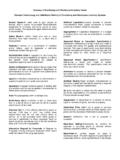Transcription of AGENDA State and Local Procurement Law …
1 AGENDA . State and Local Procurement Law Institute August 16-18, 2015. Marriott Hotel at Champions Circle Fort Worth, Texas Sunday, August 16. 2:00 6:00 pm Registration Trinity Ballroom Foyer 3:40 4:00 pm Welcome & Program Overview Trinity Ballroom Speaker: Keith McCook, South Carolina 4:00 6:00 pm Opening General Session Trinity Ballroom Topic: Procurement Principles Speaker: Steven L. Schooner, The George Washington University Law School Introduced by: Keith McCook, South Carolina Summary: What does a government hope to achieve through its Procurement system? Sometimes the simplest questions prove the most vexing. Professor Schooner will discuss the fundamental objectives for any Procurement system, the tension among those objectives, and how our selection of those objectives influences the routine decisions involved in managing the acquisition process. Materials: American Bar Association, Principles of Competition in Public Procurements, Recommendation and Report Anechiarico, Frank and Jacobs, James B.
2 Purging Corruption from Public Contracting: The Solutions are Now Part of the Problem. New York Law School Review, Vol. 143, 1995. Schooner, Steven, Desiderata: Objectives for a System of Government Contract Law, Public Procurement Law Review, Vol. 11, p. 103, 2002. Values and Guiding Principles of Public Procurement , Adopted by NIGP, Oct., 2010. 6:00 8:00 pm Welcome Reception Trinity Ballroom Foyer Monday, August 17. 7:15 8:00am Breakfast Trinity Ballroom 8:00 9:30 am General Session Trinity Ballroom Topic: Limitation of Liability Anatomy of a Clause Speaker: Keith McCook Introduced by: Richard Pennington, NASPO ValuePoint Summary: This session will provide an overview of basic risk allocation strategies commonly used in commercial contracts, followed by a sentence- by-sentence analysis of a limitation of liability clause. The presentation will be followed by a lengthy Q&A session. Attendees will be invited to share their experience on negotiating such clauses, particularly the liability caps they have successfully negotiated.
3 Materials: Anatomy of a Limitations of Liability Clause - slides National Association of State Chief Information Officers, Issue Brief - Walking the Road to the Win-Win, 2004. Pennington, Richard, and Sanchez, Corey, Negotiating Liability Allocation Terms: Risk, Indemnity, and Intellectual Property. Contract Management, Nov. 2007, pgs. 42-53. Pennington, Richard, State and Local Procurement Liability Allocation: Constitutional and Statutory Limitations, McKenna Long & Aldridge, LLP, 2006. State Public Policy Group, Limitation on Liability in Iowa IT. Contracting, Report to Iowa Department of Administrative Services, 2008. 9:30 10:00 am Break 10:00 - 12:00 pm General Session Trinity Ballroom Topic: Information Security in Government Outsourcing Speaker: Ron S. Ross, Fellow, National Institute of Standards and Technology Introduced by: Keith McCook Summary: This session will provide an overview of the Federal Government's approach to imposing security controls on its contractors.
4 The presentation will begin with an overview of NIST SP 800-53, the Federal Government's (and to a large extent, industry's) baseline catalogue of security controls. To help the audience understand what a security control is, how it works, what tailoring is, and what overlays are, the overview will include a discussion of, and examples from, Appendix F the Security Control Catalogue. The session will address the different contexts in which security controls are addressed, , cloud computing services, how some federal agencies are currently addressing security controls with their contractors, and an introduction to the Federal Government's project to publish a set of security controls specifically for outsourcing draft NIST SP 800-171. Materials: Miller, Jason, Confusion of FedRAMP? OFPP to clarify contracting language, Federal News Radio, 2014, FedRAMP-OFPP-to-clarify-contracting-lang uage National Institute of Standards and Technology, Security and Privacy Controls for Federal Information Systems and Organizations, NIST.
5 Special Publication 800-53, Revision 4. 12:15 - 1:15 pm Networking Lunch Trinity Ballroom 1:30 3:00 pm Breakout Sessions Red River Topic A: Cyber Liability Insurance: The 411. Speaker/Moderator: Rachel Whitesell, Connecticut Panelists: Linda Kornfeld, Kasowitz, Benson, Torres & Friedman LLP; Barry Fleishman, Kilpatrick Townsend & Stockton LLP; Josh Ladeau, Allied World Insurance Company Summary: This session will review the national issues, trends and concerns regarding cyber liability insurance needs for State government. Presenters will outline the importance of cyber liability insurance as well as tactics for ensuring effective Procurement of protective policies. Materials: Advisen Ltd, Cyber Liability Insurance Market Trends: Survey, 2014. Beck, David L. and Siemens, Rene L., Cyber Insurance Mitigating Loss from Cyber Attacks, Perspectives on Insurance Recovery Newsletter, 2012, 579&printF=1. Center for Strategic and International Studies, Net Losses: Estimating the Global Cost of Cybercrime, McAfee, 2014.
6 Kostadinov, Dimitar, Cyber Insurance, Infosec Institute, 2014, Lehr, Natalie, Cyber Security Practices Insurance Underwriters Demand, Information Weekly, Dark Reading, 2014, underwriters-demand/a/d-id/1318071?print =yes Panzar, Javier, Spending on Cyberattach Insurance Soars as Hacks Become More Common, Los Angeles Times, 2015, Sembhi, Sarb, An Introduction to Cyber Liability Insurance Cover, , 2013. Stone, Adam, Cyberinsurance: Do You Need It?, GovTech, 2014, Taffae, Peter R. and Magnuson, M. Damien, What Every Insurance Professional Should Know about Network Security and Privacy Liability, International Risk Management Institute, Inc, 2012. Williams, Matt, Are Governments Ready to be Buyers of Cybersecurity Insurance?, GovTech, 2013, Rio Grande Topic B: Terminations for Cause & convenience Speaker/Moderator: Bill McAvoy, Massachusetts Panelists: Maggie McConnell, NASPO Life Member; Barbara Wessinger, Assistant Chief Counsel, South Carolina Department of Transportation Summary: This interactive panel discussion will delve into the contract termination options that are available in most contracts, including terminations for cause (breach/default), convenience (without cause) and non- appropriation.
7 They will also engage the audience to discuss experiences with contract terminations in your own states. Materials: American Bar Association, Model Procurement Code Regulations, Terminations for convenience Clauses, 2000. Case Law Examples, compiled for 2015 NASPO State and Local Procurement Law Institute 3:00 - 3:30 pm Break 3:30 5:00 pm Breakout Sessions Rio Grande Topic A: Framing and Documenting Cooperative Procurements Panelists: Richard Pennington, General Counsel, NASPO ValuePoint; Justin Kaufman, Attorney/Negotiations Manager, Minnesota Department of Administration; Martin Zelinsky, General Counsel, Texas Department of Information Resources. Summary: From national cooperatives to State contracts used by political subdivisions, cooperative Procurement has a variety of faces. This interactive presentation will discuss practical issues such as structuring the solicitation to accommodate later participation, the effect of participation by entities outside the State , drafting around issues of venue and choice of law, how cooperatives may frame traditional Procurement issues like responsiveness and scope of contract, using solicitation language to manage open records/FOIA issues, handling varying socio-economic policy issues (and other differing State law requirements) in solicitations, special considerations when cooperatively contracting for services and information technology, and approaches to operating lease agreements and audit rights.
8 Materials: Cooperative Purchasing Agreement sample, Minnesota Cooperative Purchasing Venture Brochure, Minnesota Interlocal Cooperation Contract for Information Resources Technologies, Texas Master Operating Lease Agreement, Selected, Texas Department of Information Resources NASPO ValuePoint Master Agreement Terms and Conditions, Selected Nelson, James W. and LoBosco, Julia A., Understanding the WSCA- NASPO Cooperative Purchasing Organization: It's Time to Invite the Elephant Out of the Corner, Public Contract Law Journal, American Bar Association, Vol. 44, No. 1, 2014. Pennington, Richard, Kaufmann, Justin and Zelinsky, Martin, Framing and Documenting Cooperative Procurements, Prepared for 2015 NASPO. State and Local Procurement Law Institute Request for Offer template, Texas Department of Information Resources Standard Terms and Conditions For Product and Related Services Contracts, Texas Department of Information Resources Red River Topic B: Software Licensing Practical Approach to Streamlining &.
9 Standardization Panelists: Linda Hamel, Massachusetts; Keith McCook; Rachel Whitesell Summary: This session will address the Procurement side of software licensing. Each panelist will provide a short overview of their State 's approach to software licensing, both the practical issues of documentation and negotiation, but also how licensing with third parties dovetails (or not) with the competitive process that results in a Procurement contract often with someone other than the licensor. To foster discussion, the panelists will highlight differences between their states and offer comments on the comparative differences strengths and weaknesses. Strong audience participation is encouraged. Materials: Clauses for Software Licensing of Commercial Off-the-Shelf Software, South Carolina Licensing agreement samples, compiled for 2015 NASPO State and Local Procurement Law Institute Licensing Model Graphics, Prepared for 2015 NASPO State and Local Procurement Law Institute Operational Services Division (OSD): Standards for Negotiating Software Licenses, MassIT.
10 RFQ Template, Massachusetts Standard Amendment to End User License Agreements for Commercial Off-the-Shelf Software, South Carolina 6:00 pm Meet for Dinner Tuesday, August 18. 7:15 8:00am Breakfast Trinity Ballroom 8:00 9:30 am General Session Trinity Ballroom Topic: Cloud Services Issues to Consider in Procurements and Contract Negotiations Moderator: Bill McAvoy Panelists: Linda Hamel, Massachusetts, Dugan Petty, NASPO Life Member Summary: The various forms of Cloud Computing offer states the potential of enormous benefit, but getting the right model to match the State 's needs and creating the right framework of policy, Procurement , security and controls that match the data hosted in a deployment model is critical and requires alignment between various functional areas involved - attorneys, Procurement , business owners, auditors and CIOs to name a few. Given the amount of information that is currently or is projected to be stored in the cloud, it is imperative that all public Procurement attorneys are knowledgeable about the cloud, its benefits and risks, how to procure cloud services, and a checklist of issues, terms and conditions and documents to consider when contracting for cloud services.








